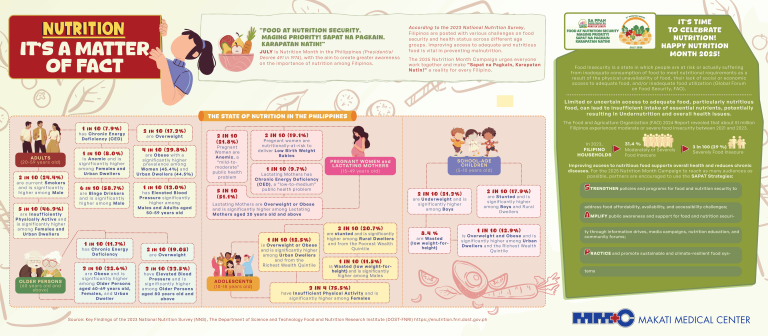Did you know that the average adult’s digestive or gastrointestinal (GI) tract is about nine (9) meters (or 30 feet) long from the mouth to the anus? Given the length, it’s no wonder your digestive system involves so many different organs, from your esophagus all the way down to your gallbladder and then to your small intestines.
Given this tract’s importance, Angelo B. Lozada, MD, a Gastroenterology Specialist from Makati Medical Center (MakatiMed), is helping unravel the mysteries of gut health, from understanding the pressing issues to learning how to keep the GI tract in top shape.
The wide world of gut-related conditions
According to Dr. Lozada, red flags for the digestive system can involve anything that happens between chewing food to expelling waste. “It starts with symptoms like difficulty swallowing or eating, then hyperacidity and abdominal pain or discomfort,” the doctor states.
Even the pain in your abdomen means different things. “Pain in the right upper quadrant could mean a problem in the gallbladder, liver, or stomach. In the left upper quadrant, it might also be a stomach issue, or something related to the spleen or colon,” explains Dr. Lozada. “For the right lower quadrant, it’s often appendicitis. For women especially, pain in the right or left lower quadrant may likely be a gynecological problem. The left lower quadrant involves the sigmoid colon, so it could be a colon issue.”
You should also watch for unexpected changes in your bowel habits and other symptoms like blood in your stool, Dr. Lozada underlines. He also encourages people to be aware of what the blood color in their stool means. Bright red blood indicates it comes from the lower gastrointestinal tract, whereas dark red blood suggests it originates from the upper gastrointestinal tract.
The doctor warns that there are cases where bright red blood is coming from the upper gastrointestinal tract (rather than the often expected lower). “And that’s dangerous as the patient could bleed to death.”
According to Dr. Lozada, acid reflux is among the most common digestive complaints. Frequent episodes of acid reflux can lead to gastroesophageal reflux disease (GERD), which is on the rise among Filipinos. When left untreated, GERD can damage the throat, airways, and lungs, causing breathing difficulties and a persistent cough.
Other common digestive conditions include gallstones, which are hard deposits made of excess cholesterol that build up in your gallbladder, and irritable bowel syndrome (IBS), which affects the stomach and intestines and is often triggered by altered gut bacteria, infections, and stress.
There are also a host of cancers that can affect the GI tract. These include esophageal, stomach, colorectal, pancreatic, and liver cancers, which all require early detection and prompt medical intervention for optimal treatment outcomes. Colorectal Cancer is particularly common in the Philippines, being the fourth leading cause of cancer-related deaths. Symptoms such as sudden weight loss, fatigue, and sudden changes in stool habits are typical signs of cancers related to the digestive system.
The keys to detecting and treating cancers early
Dr. Lozada highlights that keeping up with necessary screenings is key to minimizing cancer risks. Even without symptoms, regular screenings are important if you reach a certain age (like 50 for colorectal and pancreatic cancers) or if you have a family history of cancer (which could require you to get tested sooner than usual).
Screenings may include blood tests including complete blood count and liver function tests as well as stool exams. Sometimes, abdominal ultrasound and endoscopy or colonoscopy may be necessary for further investigation.
The doctor points to MakatiMed’s GE 3 Tesla Signa Architect MRI machine as a great help in more accurate screening and evaluation. The first of its kind in the Philippines, the machine produces more detailed images that improve the accuracy of cancer screenings.
“We’re excited about this new technology because, in gastroenterology, we deal with many cancers. In fact, we work closely with oncologists, and having this advanced imaging
technology will help us better screen and evaluate the degree of cancer invasion,” states Dr. Lozada.
Eat right to feel right
Dr. Lozada points out that as with most health issues, the road to better digestive health starts with being mindful of what you eat. This is especially true for acid-related conditions.
“Hyperacidity and acid reflux are triggered by certain food materials like caffeine, soft drinks, spicy food, and even anything citrus or tomato-based,” Dr. Lozada says. “Unfortunately, it covers a lot of the yummy treats people love.”
Dr. Lozada also advises against going overboard on red and processed meat. Recent research has shown that people who consumed higher amounts of red meat faced a 30% increased risk for colorectal cancer, while those who ate more processed meat had a 40% increased risk.
Foods that benefit gut health include probiotic-rich options like yogurt, bananas, and leafy greens, along with prebiotic foods such as bananas, apples, and oats. Fiber-rich foods like whole grains, legumes, fruits, and vegetables are essential. Healthy fats from avocados, olive oil, nuts, seeds, and fatty fish, plus polyphenol-rich foods like dark chocolate, green tea, and berries, also support gut health.
With the GI tract encompassing so many organs and being such a key part of our overall health, taking proactive steps to maintain digestive wellness can significantly enhance not only how we savor food and drinks but also our overall quality of life.
WATCH: Solving Gastrointestinal Problems with Fecal Transplantation
Article based on the MakatiMed Vodcast episode “Mind Your ‘Gut’: The State of Your Digestive System, and Your Susceptibility to Colorectal Cancer” last March 15, 2023.
For the complete list of Makati Medical Center’s Gastroenterology Specialists, click here. You may also reach us via MakatiMed On-Call at (+632) 8888 8999 or at [email protected].
Follow our social media pages for more health-related content and for the latest updates: https://www.makatimed.net.ph/social-media-pages











